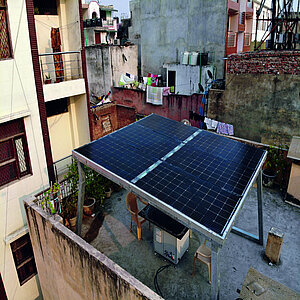India: Chancellor Merkel visits IKI project sites

At the occasion of the 5th Intergovernmental Consultations (IGC) between Germany and India, Chancellor Angela Merkel visits two IKI projects that support rooftop solar expansion in India.
From 31st October until 1st November 2019, the 5th Intergovernmental Consultations (IGC) between Germany and India took place in New Delhi – a high-level political event that was also attended by Dr Angela Merkel. During her two-day visit to India, the German Chancellor conducted bilateral discussions with President Ram Nath Kovind and Prime Minister Narendra Modi.
At the end of her trip, Chancellor Merkel visited the Delhi metro station Dwarka Sector-21 where the metro operator Delhi Metro Rail Corporation (DMRC) had set up its first solar power plant – with technical support of the – now completed – IKI project “<link en nc details project commercialization-of-solar-energy-in-urban-and-industrial-areas-in-india-comsolar-09_i_117-144>Commercialization of Solar Energy in Urban and Industrial Areas in India (ComSolar)”. The project was implemented from 2009 until 2016 by the Deutsche Gesellschaft für Internationale Zusammenarbeit (GIZ) GmbH, which advised DMRC on financing and planning the solar systems and supported the operator in finding suitable buildings for the solar panels’ installation. In the project’s pilot phase, the roofs of three metro stations were equipped with solar systems, serving as a basis for planning and realizing more installations. Of the three locations, the first pilot project with an output of 500 kW has been installed on the roof of the Dwarka Sector-21 metro station under a Renewable Energy Service (RESCO) model in August 2014.

The Chancellor also visited a small stand-alone solar system – Photovoltaic (PV) Port&Store. In the framework of the IKI project “<link en nc details project integration-of-renewable-energies-into-the-indian-electricity-system-ire-14_i_207-412>Integration of Renewable Energies into the Indian Grid system (I-RE)”, the implementing organisation GIZ was asked by the Indian partner Ministry to develop a “plug & play” residential solar system with battery backup to provide 24/7 solar energy to Indian households. A corresponding technical concept was developed and by December 2018, the first prototype of the requested solar system was handed over to the Indian National Solar Institute (NISE). The PV Port, designed with solar panels in the shape of an airplane, is a plug-based, standardized, mass-produced, cost effective solar system for the slow developing Indian residential solar rooftop market.
In order to combat the harsh climate in India, the PV Port has cooled benches filled with water to keep the electronics inside at a low temperature, to provide ballast against high wind speeds but most important to provide water for a sprinkler system to remove the dust from the solar panels. India has set an ambitious target of 40 GW by 2022 (with 4GW by 08/19) rooftop installation with most installations taking place in developed urban areas, so-called Smart Cities. The project I-RE aims at linking climate and energy policies in India, with a focus on urban development. 
It is supporting selected cities of the Indian “Smart City Mission” in scaling-up business models to promote and further develop solar rooftop installation. This will also lead to more generation of renewable energy in the Indian electricity system and in further reductions of emissions from electricity generation.
At the end of her “solar rooftop visit” at the Dwarka 21 station, Chancellor Angela Merkel stepped out to the forecourt where there was a line of electric rickshaws, being powered by solar energy instead of petrol. Having renewable energy generation and electric mobility on and under one roof lets hope for the further development of Indian mega cities into clean and less polluted urban areas.
The link has been copied to the clipboard
Contact
IKI Office
Zukunft – Umwelt – Gesellschaft (ZUG) gGmbH
Stresemannstraße 69-71
10963 Berlin














